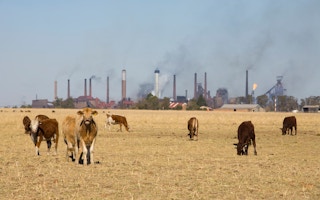As rocketing energy and food prices fuel inflation and social discontent in many countries, the world may have entered a period of “big turbulence” that could force a green transition in the global economy, said a leading environmental scientist.
Johan Rockström, director of the Potsdam Institute for Climate Impact Research (PIK), said in an interview this week that the old model of powering growth with fossil fuels has run aground, with Russian supplies squeezed by the Ukraine war.
Insufficient clean energy capacity has been added to replace coal, oil and gas, leaving some major economies such as Germany facing the prospect of winter electricity outages, he added.
“We have underinvested in all the new renewable energy systems for decades and now we’re paying the price really badly,” said Rockström, co-author of a new book that urges what it calls a “Giant Leap” towards a greener and fairer society.
The Swedish academic - who developed the concept of “planetary boundaries” that must be respected to ensure a “safe operating space for humanity” - warned that today’s tough times may last for a decade but emphasised that the painful transition would lead to a future with cheaper, cleaner energy.
“
What we’re seeing right now in 2022 - with the inflation and the geopolitics in the world and the distrust we’re having - is that we’re rather moving backwards than forwards.
Johan Rockström, director, Potsdam Institute for Climate Impact Research
“We will have a solar-powered world economy which will give us per kilowatt-hour even more energy per US dollar,” he said.
“It will be more stable, more (equally) distributed and more democratic because it won’t be in the hands of a few autocrats, it will be in the hands of every nation or every household even.”
To achieve this, leaders must take difficult decisions now to end investment in exploiting and using fossil fuels and to set a global price on planet-heating carbon, said Rockström.
“I would argue that we may have entered that (transition) phase because we are starting to hit the wall on food, on energy and many other finite natural resources,” he added.
‘Survival guide’
The new book, “Earth for All: A Survival Guide for Humanity”, presents five solutions - ranging from reforming the global financial system and tackling wealth inequality to achieving gender equity and net-zero emissions by mid-century.
The book presents the results of a two-year analysis which finds that the investment needed to make the proposed “Giant Leap” is 2-4 per cent of global gross domestic product per year - less than annual subsidies to fossil fuel industries.
“This is easily affordable, and it will create millions of jobs,” said fellow author Sandrine Dixson-Declève, co-president of The Club of Rome, a nonprofit policy group. “What is missing is coalitions of politicians willing to make it happen.”
The analysis modelled a second vision of the future, dubbed “Too Little, Too Late”, in which the world continues its neoliberal economic policies, leading to warming of 2.5C that stokes risks to climate and nature, more extreme inequalities and rising social tensions within and between nations.
However, today’s global developments make even this scenario seem optimistic, Rockström warned.
“What we’re seeing right now in 2022 - with the inflation and the geopolitics in the world and the distrust we’re having - is that we’re rather moving backwards than forwards,” he said.
A survey accompanying the analysis, on attitudes to transformation, found that in G20 countries, about three-quarters of people support a change in economic systems to look beyond a focus on profit and encompass health and the planet.
Yet Rockström said that the hardships faced by many families in a world racked by the pandemic, war and inflation may lead to a short-term decline in public mobilisation for climate action.
“The first reaction of the turbulence in the world economy is that people start looking inwards,” he said, adding that young protesters would likely return to the streets at some point.
Ultimately, making the envisioned “Giant Leap” will be a messy process - but there is far more evidence today that decarbonising business and circular use of scarce resources make economic sense, Rockström argued, citing rapid expansion of solar power in Texas and electric vehicles in the auto industry.
“It’s not so much about saving the planet,” he said. “It’s really about more competitive, more strategic and more economically sensible ways of operating.
This story was published with permission from Thomson Reuters Foundation, the charitable arm of Thomson Reuters, that covers humanitarian news, climate change, resilience, women’s rights, trafficking and property rights. Visit http://news.trust.org/climate.










